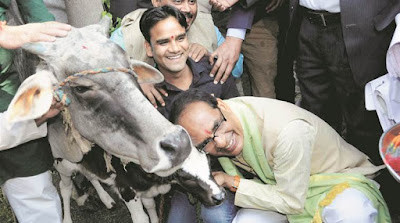It’s often said
that cow, in India, is a political animal. She gives milk as well as votes, and
of course cow dung, cakes of which is used as fuel for making food. She’s a
holy animal for Hindus, which I too believe in, irrespective of the never
ending debate over when and how she became sacred for the Hindus. Unfortunately,
she’s is in the news for all the wrong reasons.
Most of us
recently saw the video of how four men, suspected of trading in cow skin, were
brutally thrashed by a mob of cow vigilante in Gujarat's Somnath district. It
was a shameful, inhumane incident and a gross violation of the law and human
right. Any sensible government would have had immediately acted against the perpetrators
and ensured toughest punishment for them. But that was not to happen. Arrests
came late and customary to the gravity of the crime.
It’s a well
known fact that these cow vigilante groups have been active in India for years,
but experts believe they have been emboldened after the BJP government came to
power in May 2014.
The stated aims
of these cow vigilantes are to spread awareness about cow, and prevent its
slaughter and illegal trade. Driven largely by the faith they out rightly
dismiss their links to the ruling BJP or its ideological mentor, the RSS. They
are educated, fluent in social media, a far cry from flag-bearing, slogan-shouting
activists. They thrive on strong network of informers – which often include
vegetable vendors, cobblers, rickshaw pullers etc. Their contention is that they
are doing all this to bring ‘sanskaar’ (values) back into society and strive
to make cow the national animal, and hang those who slaughter her. In many
states they have institutional back-up. For example in Gujarat, a ‘Gau rakshaks’
qualifies for an award of Rs. 500 for every cow he/she rescue under a
government scheme. They are eyes and ears of law enforcement agencies in states
where law prohibits cow slaughter. “We work with police, alert them whenever
our members inform us,” said one of the ‘Gau rakshak’ to a national daily.
Their proliferation is also attributed to failure of enforcement agencies
tasked with cow protection to implement the law.
In fact, cow
protection has been a key BJP agenda from the beginning, and the animal has
helped the party with rich dividend elections after elections.
To
understand the importance of cow for the BJP one needs to peep into the
election manifesto in various states where it is in power. In 2013 for
Rajasthan polls, the party promised to set up a separate Cow Rearing ministry. The manifesto also vowed cow protection
police posts, special insurance policies for cow-shepherds. Similarly, party’s
policy statement for Madhya Pradesh promised a separate animal ambulance
service, separate cattle grazing land development board and efforts to be made to
produce and sell items made out of dung and urine.
In
Chhattisgarh a separate board for cattle grazing land, and setting up cow
shelters with the latest facilities and amenities was promised in the party’s
poll manifesto. In 2012, during the Uttar Pradesh Assembly elections, it
promised a free cow to each of the over five lakh families living below poverty
line.
In Haryana,
the Manohar Lal Khattar led BJP government has appointed IPS Officer Bharti
Arora to supervise & check cow slaughter and smuggling. In Oct 2015 Haryana
Health Minister Anil Vij started an online poll, raising the query – should the
cow replace the tiger as the national animal? Recently, the Haryana Gau Sewa
Ayog sent a proposal to the government to impose 5% 'cow cess' on cinema
tickets.
Given BJP’s
obsession with cow protection, experts say has led to embolden the cow
vigilantes, many of whom were reticent before 2014. The democratic institutions
too along with promotion of nonpartisan by the government had out powered such
sentiments for years, but things have changed now.
Sadly, opposition
leaders too have limited themselves to paying lip-service fearing counter
polarization would result into loss of votes. At the same time denouncement of
such vigilantism by the government has been far from being forceful. Fearing reprisal,
law enforcers are scared to touch the perpetrators and often go lax on them.
Silence of both the centre and the state governments have further emboldened these
vigilantes and their targets are those who are socially and economically the
least empowered citizen of this country, the Dalits and the backward Muslims.
Ironically,
despite this obsession of some to protect the cow, India remains one of the
largest exporters of beef.





